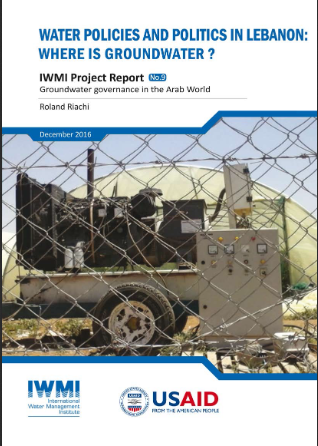Water policies and politics in Lebanon: where is groundwater?
 |
rapport coll. IWMI Project Report n° 9 Dec 2016 ; 39 pages
Aut. Roland Riachi
Ed. IWMI - Giza USAID - Antelias
Téléchargeable sous format: PdF
Téléchargeable chez l'éditeur
Abstract:
The objective of this report is to analyse the contemporary challenges facing groundwater resources in Lebanon. From the evolution of land tenure regimes to modern politics, we outline the use and mismanagement of groundwater in the country. The intensive use of groundwater resources is of relatively recent origin, dating back no more than half-century in most countries.
In order to understand and address groundwater challenges, this report first covers the production of groundwater from natural endowments and climate change, uses and pollution (Sections 1-3). Secondly, the report looks into the place of groundwater in water policies (sections 4-5). Contents:
1 Introduction
2 Hydro-geography, climate change and groundwater conditions
3 Urbanization, public network and the wells option
4 Aquifers in the agricultural economy of Lebanon
5 Accessing groundwater: from Levantine customs to modern legal framework
5.1 The Ottoman Empire: practices, customs and reforms over groundwater
5.2 From shallow to deep wells: French Mandate to modern laws
5.3 Recent legislative changes regarding groundwater regulation
5.4 Current process for well permits, enforcement limitations and problems
5.5 Other complementary recent laws
6 Institutional fragmentation and the forgotten aquifers
6.1 Institutionalized political arrangements in Lebanon’s water authorities
6.2 The 221/2000 water reform and groundwater stress
6.3 On the roots of the Lebanese water supply-sided vision
7 Conclusion
Public-Cible:
Mots clefs: |
accès à l'eau (CI) (DT) (OP) (ope) , aspects institutionnels (CI) (DT) (OP) (ope) , législation, lois (CI) (DT) (OP) (ope) , politique (CI) (DT) (OP) (ope) |
Pays concerné: |
Editeurs/Diffuseurs: |
|
IWMI
-
International Water Management Institute - Giza - Egypte |
USAID
-
US Agency for International Development - Antelias - Liban |
En cas de lien brisé, nous le mentionner à communication@pseau.org